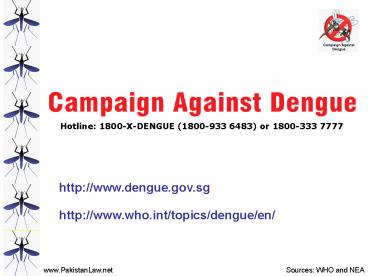Dengue - PowerPoint PPT Presentation
1 / 8
Title: Dengue
1
Hotline 1800-X-DENGUE (1800-933 6483) or
1800-333 7777
http//www.dengue.gov.sg
http//www.who.int/topics/dengue/en/
2
What is Dengue?
- Dengue Fever and Dengue Haemorrhagic Fever (a
more severe form) are the most common
mosquito-borne viral diseases in the world. - Dengue Fever is an illness caused by infection
with a virus transmitted by the Aedes mosquito.
There are four types of this virus (serotypes 1
to 4) which can infect you.
3
Dengue Hotspots
E-week 37 11 September to 17 September
2005Total number of cases 697
4
When should I suspect Dengue?
- High Fever 39-40 degrees C.
- The fever lasts for 5-7 days. In some patients,
fever comes down on 3rd or 4th day but comes
back. - PLUS severe headache (mostly in the forehead),
pain behind the eyes, body aches and pains, rash
on the skin and nausea or vomiting. Bleeding is a
sign that it has become very dangerous. - All the above symptoms and signs may not be
present in the patient.
5
What is the treatment? Is it curable?
- There is no specific cure for dengue fever.
- Paracetamol is the drug of choice to bring down
fever and joint pain. - Those suffering from DHF can sometime die from it.
6
How does Dengue spread?
- The bite of an Aedes mosquito
The female mosquito lays 30-150 eggs every 2-3
days. Human blood is needed to nourish these eggs
Aedes mosquitoes are identified by the black and
white stripes on their body.
7
Mosquito Life Cycle
The mosquito goes through four separate and
distinct stages of its life cycle Egg, Larva,
Pupa, and Adult. Each of these stages can be
easily recognized by its special appearance.
8
Preventing the spread of Dengue at Home
- STOP the breeding
- Cover bamboo pole holders.
- Remove air-conditioner trays.
- Change water in flower vases.
- Remove water in plant pot plates.
- Clear fallen leaves and stagnant water in drains
and garden. Some leaves can collect water. - Use sand granular insecticide for areas prone to
collect water. - Throw your trash into trash bins.































